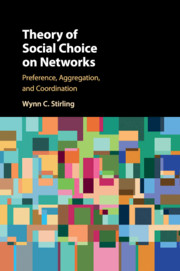Book contents
- Frontmatter
- Dedication
- Contents
- List of Figures
- List of Tables
- Preface and Acknowledgments
- Introduction
- 1 Preference
- 2 Aggregation
- 3 Deliberation
- 4 Coordination
- 5 Randomization
- 6 Satisficing
- Appendix A Dutch Book Theorem
- Appendix B Bayesian Networks
- Appendix C Probability Concepts
- Appendix D Markov Convergence Theorem
- Appendix E Entropy and Mutual Information
- Bibliography
- List of Authors
- Index
4 - Coordination
Published online by Cambridge University Press: 05 September 2016
- Frontmatter
- Dedication
- Contents
- List of Figures
- List of Tables
- Preface and Acknowledgments
- Introduction
- 1 Preference
- 2 Aggregation
- 3 Deliberation
- 4 Coordination
- 5 Randomization
- 6 Satisficing
- Appendix A Dutch Book Theorem
- Appendix B Bayesian Networks
- Appendix C Probability Concepts
- Appendix D Markov Convergence Theorem
- Appendix E Entropy and Mutual Information
- Bibliography
- List of Authors
- Index
Summary
The further a mathematical theory is developed, the more harmoniously and uniformly does its construction proceed, and unsuspected relations are disclosed between two separated branches of the science.
—David Hilbert Quoted in N. Rose: Mathematical Maxims and Minims (Rome Press, 1988)It is no paradox to say that in our most theoretical moods we may be nearest to our most practical applications.
— Alfred North Whitehead An Introduction to Mathematics (Oxford University Press, 1948)Coordination Concepts
The concept of coordinated group behavior has received great attention in the analysis of social systems (cf. Schelling (1960), Lewis (1969), Bicchieri (1993), Cooper (1999), Malone et al. (2003), Goyal (2007), Jackson (2008), Shoham and Leyton-Brown (2009), Easley and Kleinberg (2010)). Much of the focus is on so-called coordination games, where two or more individuals must each choose one of several alternative actions. Most such studies, however, do not involve explicit notions of group-level behavior. Rather, a social engagement is deemed to be a coordination scenario if there is an opportunity for the individuals to cooperate for their mutual benefit. Games such as Hi-Lo, the Battle of the Sexes, and the Prisoner's Dilemma as discussed by Axelrod (1984) are prime examples of coordination scenarios. Mutual benefit, however, is not the same as group preference. There is a difference between the behavior of individuals whose categorical preferences just happen to be aligned, even though there is no explicit social relationship between them, and the behavior of individuals who are linked together by social influence. With the former, any notions of group benefit are exogenously imposed ex post, but with the latter, group preference, if it exists, emerges endogenously as a consequence of the social relationships that are formed as ex ante social influence propagates through the network.
If all individuals possess categorical preferences, then the concept of group preference is not an innate property of the collective. It is an uncomfortable fact that game theory does not provide a definitive resolution of the so-called cooperative scenarios such as Hi-Lo and the Battle of the Sexes. Both games have multiple Nash equilibria, but game theory does not provide a definitive way to choose from among them.
- Type
- Chapter
- Information
- Theory of Social Choice on NetworksPreference, Aggregation, and Coordination, pp. 96 - 114Publisher: Cambridge University PressPrint publication year: 2016



